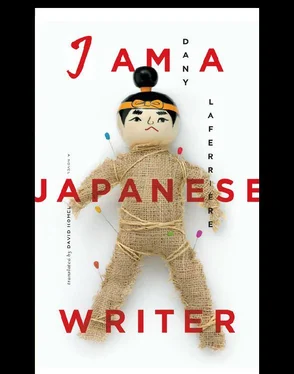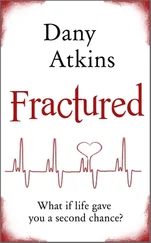“They put everything into a little bag,” I continue, paying no attention to the sexual game.
“Slap the handcuffs on him,” he says, looking me in the eye.
I don’t move. They push me again. At the last minute the older cop puts a stop to the ballet. A real burlesque. Meanwhile, I’m still somewhere in ancient Japan. I’m no longer part of the circus unfolding before my eyes.
“Now you’re going to show me where you hide the coke.”
“I don’t do coke.”
He moves on me again. As close as he can, with his nightstick. It’s becoming an obsession.
“I’m talking about the coke you sell.”
“I don’t sell coke, either.”
I’ve made the mistake of answering too quickly. We’re in dialogue mode. I had better slow down, and fast. The cop keeps moving closer, which makes his young partner uncomfortable. Don’t worry, in a few years he’ll master the art of playing with black men’s penises with his nightstick. And he’ll fondly remember his first lesson.
“What with you selling coke. .” Now he picks up the rhythm. “The neighbors are complaining.”
I don’t answer. He pushes my thighs apart with his leg. He is so close all I can see is his stomach (he’s in good shape for an old guy) — though, from the corner of my eye, I catch sight of the younger guy. A look of interest has replaced his discomfort.
“Where do you hide it?”
A pause. Rhythm is everything here. Interrogation demands a special tempo. Too quick, and you’re in confrontation mode. Too slow, and you’re impertinent. Discreetly, I tap my right foot to the rhythm, which creates a light but insistent pressure on the policeman’s thigh.
“Screw you!”
And he hits me in the shoulder. The young cop is worried. You’re not supposed to hit a citizen who represents no apparent danger. He tells himself that if he doesn’t react, he’ll become an accomplice. His career has just started. He’s wondering what is happening. I can see that in his worried mouse eyes. The older cop heads for the bathroom. He slams the door on his partner, who was following after him. The older cop spends a while there. I hear the water run. The younger cop gives me a look, trying to understand what has just happened. A neutral face. A young guy who just joined the force. A lot of times, young kids from the country have no idea how big-city cops act. They’ve never seen blacks or Arabs in their part of the world.
“Where do you come from?”
He hesitates.
“Gaspé.”
“I’ve been to Trois-Pistoles.”
His face brightens.
“My mother’s from Trois-Pistoles. . What’s happening? Why did he hit you?”
“No idea.”
We heard the toilet flush. The cop came out, a big stain on his pants.
“I got soaked,” he said with a sheepish look. “Let’s go. I got a desk full of paperwork to do.”
I understand then that his little raid has been a personal initiative. He saw the file with my address. He came here to intimidate me, knowing that I wouldn’t be stupid enough to complain.
SOME PEOPLE OWN their time: “I’ve got all day.” Others are owned by it: “I don’t have the time.” Then there’s the “lost time” of the suicide. Mishima refused to enjoy the time that was rightfully his, not wishing to abuse the instinct to conserve. The worldly man’s need to conserve frightened him. The adventurer Morand tried to go faster than time. Spur on the horses! Desire is an excellent compass. The more you desire something, the shorter time seems. Unless you’re waiting for a phone call from a woman you met the day before. In Tokyo, a place I’ve never been, time is kept in pretty little lacquered cases. If you want three days, they will sell them to you. For money? No. You can pay for time only with other time. They will sell you three gray days for two sunny days and one sad night. Or an hour for one fresh kiss. I would like to buy Japanese time with mimosas running with rain. Basho makes you think he is traveling outside of time.
I TURNED ON THE TV. Actually, I just bumped up the sound, because I never turn the set off. I remember an old Hungarian immigrant I met at the airport when I first got here. He insisted on giving me this piece of advice: “Here, in America, you never turn off the television.” I’ve been proving him right all these years. I want to see everything without really looking. I did some channel-surfing and came across Midori dressed as the Weather Girl. She was on a local cable channel I never watch. I don’t know anyone on it. People watch tv to see the people they’ve seen on other channels. Virtual socializing. They feel less alone. It’s a busy world out there. People arriving, people leaving. New faces that hope to be the latest on the scene. Others come on only at dinner, then disappear. Actually, they end up somewhere else, on shows I don’t watch. Sometimes you can spot them when you’re doing your TV window shopping, and you’re amazed to see them in some less desirable district. Some of them have frayed collars. Ah, times are tough. All it takes is one small intellectual breakdown, and they end up with the hoi polloi and those hayseed stars with their loud ties. That is, if they don’t fall all the way down to the circus acts, guys who laugh when some woman gets beat up or want to send all the immigrants back where they came from. The former star host who discovers that the fall, when it comes to TV, can be endless.
“We haven’t seen you much lately, sir.”
“I’m around,” replies the former host with a thin, cathoderay smile.
“I liked watching you. . Are you coming back with a new show?”
Since he never left the screen, the question comes as something of a surprise. He wonders for a brief moment whether it’s worth telling a total stranger the sad story of his fallingout with his bosses, the resulting years in court.
“Please excuse me, but I have some errands to run.”
“Of course, I understand. . There’s no one like you on tv anymore, it’s really too bad.”
“Thank you.”
He disappears into the milky landscape of a screen without pictures. The stranger grabs him by the sleeve, as if they’re in some vaudeville comedy.
“Just a minute, sir… Tell me your name again, would you? It’s for my wife, you know, otherwise she won’t believe me when I say I met you.”
The years spent making a name. Forgotten already. TV death. Everything depends on the audience. The critics, the prizes, the congratulations, none of that matters anymore. Only one thing counts: that they pronounce your name right. Even a name as easy as Leo can take years for people to get into their heads. First they have to wipe all the other Leos from their memory — and that can include close relations. He’s the only Leo now, the one and only.
The number of channels is out of control. One channel is dedicated to nothing but the Second World War, and Hitler is on it so often I call it the Nazi Channel. Another gives the weather, twenty-four hours a day. What’s the weather like today? I don’t care. I watch everything, undiscerning. You don’t judge TV; you watch it. The way you watch a wall. Some refuse to leave, and that causes a traffic jam of failures. It’s impossible to disappear completely now, like in the old days when there were only two channels. Nowadays, before you hit absolute bottom, there are several stages of impact-softeners. A gentler fall. From A to Z. You start your real descent at F. The slope is steeper after L. You land on your S. From then on you hit the channels where you have to pay with your flesh and blood; you accept the surgeon’s scalpel for an extreme makeover. Some starlets will go under the knife live for three miserable points of market share. Channel U, Channel V, Channel W. Z is for zombies: people dressed in black whose voices are barely audible. Forget about ever making it back to the surface. If you want to prolong your descent, there’s always the third world. In any case, Midori looks great in her colorful kimono with sticks in her hair. It’s a disguise; normally she wears jeans and a T-shirt. By dressing up as Japanese, she is less herself. Midori as a Japanese woman is not really Midori. Anyway, Midori doesn’t interest them: all they want is a geisha. Midori, I suppose, needed the money. Or maybe her agent sent her there for the experience, to get used to the camera. She gives us the weather until next Thursday — I’d like to hear it for the rest of the year. What if her prognostications are wrong (it’s like being at the racetrack) and it’s sunny next Thursday? Tomorrow, she’ll predict the weather until Friday. Every day erases the memory of the day before. The weather report can’t be associated with journalism. You can’t fact-check the weather, you can only observe it. Notions of truth and falsehood are not at issue here. It all depends on magic, superstition and inflated hopes. Strangely, the weather report is more respectable than the horoscope. Lonely drinkers use both in bars downtown, on Thursday nights, to try and pick up girls. It’s fuel for conversation. Now Midori is smiling at the camera for the first time. That’s her weak point: she never smiles. It won’t take long before the viewers start to complain. That’s why they watch the weather on tv. Otherwise, the radio would be good enough. On TV, we want someone who will smile at us no matter how lousy the weather will be the next day. The future must be bright. I should write a letter to the station to balance out the hateful hordes who will surely point out Midori’s exotic appearance: the first unsmiling Weather Girl. You don’t mess with the weather — not in this country of intense and endless cold. Giving the temperature is like being a doctor providing a diagnosis. It doesn’t matter whether it’s Midori or someone just dressed as a Japanese woman (the problem with being a foreigner is that you’re not allowed to play anything but folklore). I’ll mention Midori’s absent but elegant smile. Now I’m writing letters to the tv. I’d better go to bed.
Читать дальше












